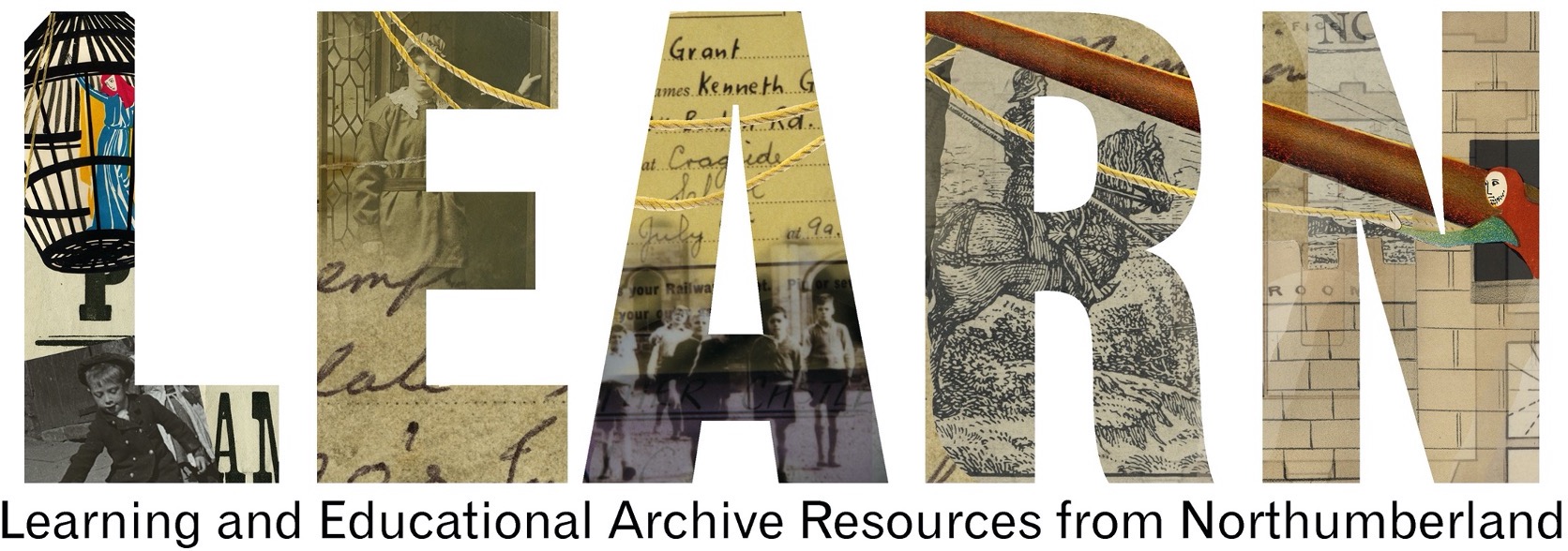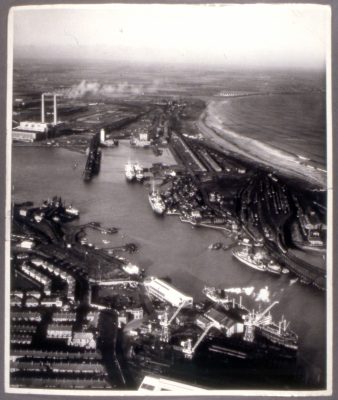Bombing of Blyth Oral Histories – Maureen H, recorded 2007
Reference: T/450, NRO 5525/15/10
Suggested age groups: KS1, KS2, KS3, KS4, Lifelong Learners
Subject areas: WW1, WW2, Air Raids, Bombing of Blyth
Download Word Document
Download PDF
The photograph of Blyth Harbour has been provided by Blyth Harbour Commission.
Maureen H – T/450
CONTEXT
These sound files are extracts (short edited pieces) from longer oral history interviews preserved by Northumberland Archives. These interviews were made as part of a project to collect the memories of people who lived on the Northumberland coast.
These sound files are extracts (short edited pieces) from longer oral history interviews preserved by Northumberland Archives. The sound quality of this recording is not perfect. Maureen’s voice dips out and there is some background noise.
Maureen talks about the memories of her parents, and stories that they told her about wartime Blyth. She mentions the bomb that bounced up the river, and bombs falling at Newsham Gates. She talks about air raids and how people didn’t understand the changes at first and didn’t understand that they were at threat of being bombed by the German’s. She talks about air raids where young women were more interested in going to the dance that they were all dressed up for than taking shelter. She also talks about how people went out into their gardens to have a look when the air raid sirens first went off. She describes that there were sudden changes in Blyth and that the beach was closed off for five years during the war and was used by the forces. She describes people not understanding why they suddenly could not take their Sunday evening walk around the prom as the Ministry of Defence had closed Blyth beach.
ACTIVITIES
ACTIVITY 1
Background
Maureen talks about the memories of her parents, and stories that they told her about wartime Blyth. She mentions the bomb that bounced up the river, and bombs falling at Newsham Gates. She talks about air raids and how people didn’t understand the changes at first and didn’t understand that they were at threat of being bombed by the German’s. She talks about air raids where young women were more interested in going to the dance that they were all dressed up for than taking shelter. She also talks about how people went out into their gardens to have a look when the air raid sirens first went off. She describes that there were sudden changes in Blyth and that the beach was closed off for five years during the war and was used by the forces.
SEE
See: Who told Maureen stories of wartime Blyth?
See: Who closed Blyth beach during the war?
See: How was Blyth beach used during the war?
See: What types of bombing and air raid attacks does Maureen describe?
See: How does Maureen describe people’s reactions to air raid precautions?
THINK
Think: Why do you think Blyth was bombed during the war? You could use a map of Blyth to help you identify Blyth’s geographical, environmental and industrial features.
Think: Why did Blyth have defences on the beach?
Think: Why do you think people didn’t understand air raid measures at first?
Think: Why do you think people stood watching the planes come over rather than taking shelter?
Think: Do you think Maureen experienced the war first-hand? Why?
DO
Do: Look at the data gathered by the War, State and Society Bombing Britain website, can you sort the data so that you can only see the bombings that took place in the North of England?
Do: Using the data from Bombing Britain, create a map showing the places that were bombed in the North of England.
Do: Using the data from Bombing Britain, create a table showing the bombings that took place in the Blyth area.
Do: Using the data from Bombing Britain, create a table showing the number of casualties that occurred as a result of bombings in Blyth.
Do: Imagine you are in charge of Blyth’s air raid defences. Create a plan of how you could make Blyth’s residents understand the importance of air raid defences and what to do when they hear the air raid siren.
Do: Script a conversation between an air raid warden and one of the girls heading to the dance.
Do: Write a diary entry from the perspective of someone who watched the German planes approach.
Do: Write a letter from the perspective of a Blyth resident to a friend or relative who lives elsewhere, telling them about the changes that have been made to Blyth.
Resources
ACTIVITY 2
Background
These sound files are extracts (short edited pieces) from longer oral history interviews preserved by Northumberland Archives. These interviews were made as part of a project to collect the memories of people who lived on the Northumberland coast.
SEE
See: Why were these oral histories recorded?
See: Who took part in these oral history interviews?
See: What is included in the oral history extracts?
THINK
Think: What is an oral history?
Think: Why is it important to record oral histories?
Think: What is the value of oral histories?
Think: Who might use oral histories?
Think: How reliable are oral histories?
Think: What types of oral histories might be recorded?
DO
Do: Imagine you are about to interview a someone who experienced the bombing of Blyth for an oral history. Write down a list of questions or talking points that you might use to prompt them during the interview.
Do: Write down a list of events that have taken place during your lifetime that you think it would be important to create oral history records of.
Do: Write down a list of events that have taken place before your lifetime that you think it would be important to have oral history records of.
Do: Look at the British Library, British Library Sounds and Imperial War Museum websites. Can you find oral history recordings about the events from your lists?
Do: Think of an event that you have experienced first-hand. In pairs, interview each other about your chosen events and create oral history recordings.
Do: Do you think oral history recordings should be made using second-hand stories or should they be made using only first-hand events? Debate this in groups.
Resources
OTHER ONLINE RESOURCES
BBC Peoples War website, page with memories of Blyth: https://www.bbc.co.uk/history/ww2peopleswar/stories/00/a6825800.shtml
Port of Blyth website, page about the history of the port: http://portofblyth.co.uk/history/
Air Raids
Imperial War Museum website, page about air raid preparation: https://www.iwm.org.uk/history/how-britain-prepared-for-air-raids-in-the-second-world-war
Imperial War Museum, page about what to do in an air raid: https://www.iwm.org.uk/history/what-to-do-during-an-air-raid
Imperial War Museum website, page with example of a “siren suit”: https://www.iwm.org.uk/collections/item/object/30097186
War, State and Society website, page with Bombing Britain database: http://www.warstateandsociety.com/Bombing-Britain
Blyth Beach Defences
Blyth Battery https://www.blythbattery.org.uk/
Simpson and Brown architects website, page about restoration of Blyth Battery: https://www.simpsonandbrown.co.uk/architecture/ruins-monuments/blyth-battery/
Historic England website, page about Blyth Battery: https://historicengland.org.uk/listing/the-list/list-entry/1021401
Oral History
Website for Oral History Society, includes definition of oral history: https://www.ohs.org.uk/
University of Leicester information sheet on oral history (pdf). Although the language isn’t the most accessible it does discuss value and reliability of oral histories: https://www.le.ac.uk/ur/emoha/training/no1.pdf
Website for Glasgow Women’s Library, blog discussing oral history project, includes definition: https://womenslibrary.org.uk/2017/08/09/what-are-oral-histories-and-why-are-they-important/
British Library website, page for oral history collections: https://www.bl.uk/collection-guides/oral-history
British Library Sounds website, includes oral history recordings: https://sounds.bl.uk/Oral-history
Imperial War Museum website page for oral history collections, one of the biggest oral history collections in the country. Many can be searched and listened to online: https://www.iwm.org.uk/collections/sound


